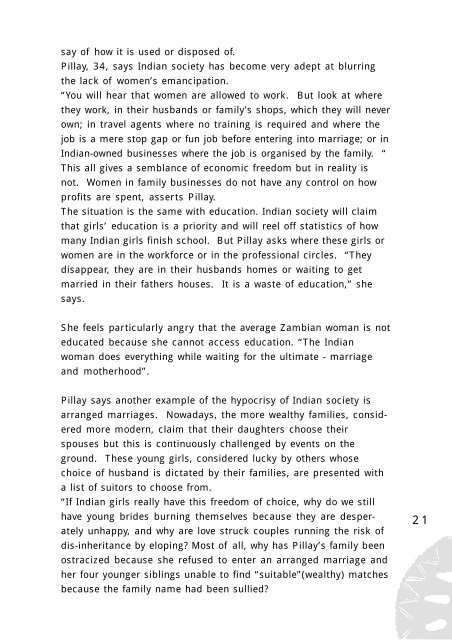Create successful ePaper yourself
Turn your PDF publications into a flip-book with our unique Google optimized e-Paper software.
say of how it is used or disposed of.<br />
Pillay, 34, says Indian society has become very adept at blurring<br />
the lack of women’s emancipation.<br />
“You will hear that women are allowed to work. But look at where<br />
they work, in their husbands or family’s shops, which they will never<br />
own; in travel agents where no training is required and where the<br />
job is a mere stop gap or fun job before entering into marriage; or in<br />
Indian-owned businesses where the job is organised by the family. “<br />
This all gives a semblance of economic freedom but in reality is<br />
not. Women in family businesses do not have any control on how<br />
profits are spent, asserts Pillay.<br />
The situation is the same with education. Indian society will claim<br />
that girls’ education is a priority and will reel off statistics of how<br />
many Indian girls finish school. But Pillay asks where these girls or<br />
women are in the workforce or in the professional circles. “They<br />
disappear, they are in their husbands homes or waiting to get<br />
married in their fathers houses. It is a waste of education,” she<br />
says.<br />
She feels particularly angry that the average Zambian woman is not<br />
educated because she cannot access education. “The Indian<br />
woman does everything while waiting for the ultimate - marriage<br />
and motherhood”.<br />
Pillay says another example of the hypocrisy of Indian society is<br />
arranged marriages. Nowadays, the more wealthy families, considered<br />
more modern, claim that their daughters choose their<br />
spouses but this is continuously challenged by events on the<br />
ground. These young girls, considered lucky by others whose<br />
choice of husband is dictated by their families, are presented with<br />
a list of suitors to choose from.<br />
“If Indian girls really have this freedom of choice, why do we still<br />
have young brides burning themselves because they are desperately<br />
unhappy, and why are love struck couples running the risk of<br />
dis-inheritance by eloping? Most of all, why has Pillay’s family been<br />
ostracized because she refused to enter an arranged marriage and<br />
her four younger siblings unable to find “suitable”(wealthy) matches<br />
because the family name had been sullied?<br />
21
















